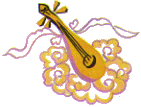Giac Duyen
by Ellen N.
A truer or more capable friend could never be found than Giac Duyen of the Tale Of Kieu. A Buddhist nun, she is described as a kind-hearted prioress, when Kieu first meets her. We don t know much about her past and the only clue to her appearance that we are given is that she is elderly. It is through the integrity of her actions that we come to know Giac Duyen. She is the instrument through which the protagonist Kieu is able to obtain a major change in destiny or karma.
Giac first enters the story when Kieu is on the run from Miss Hoan, the jealous wife of Thuc, Kieu's lover and husband. Kieu has traveled all night when she comes upon a Buddhist church where Giac is the prioress. Kieu gives Giac a bell and gong that she says are gifts from her own prioress that will be following shortly. Giac takes her in and Kieu stays there for a season until a pilgrim comes along and identifies the gong and bell as possibly being as Miss Hoan's. Giac is gentle and non-judgmental and truly worried when she suspects that Kieu, may have stolen a bell and gong from Miss Hoan. When Kieu discloses her true life story, Giac feels compassion and deep concern for Kieu and teeters between plain pity and dire dread. She tells Kieu, "The Buddha's gate is open wide to all. But things I can't foresee are what I dread. I'd sorely grieve if something struck you here. Plan far ahead and flee - you'd be unwise to sit and wait till waters reach your feet". By encouraging Kieu to leave she prevents her from coming into the grips, once again, of the vindictive Miss Hoan.
Giac enters the story again during the trial scene. Kieu's most recent husband,
a fearless warrior, upon returning from a major conquest, listens to Kieu's litany
of those who have helped her and harmed her. He decides that they should grant rewards
and punishments in the form of a trial or ceremony. Giac is asked to come as an honored
guest. During the trial she says of Giac, I yet recall how I once tripped and fell
- a hill of gold could not repay your love. The trial completed Giac wants to take
her leave and Kieu protests, expressing the closeness she feels for Giac. Giac says
not to worry, that she met a prophetess that predicted their meeting at that time
and that they are destined to meet again in five years. Kieu asks Giac if she meets
the prophetess again if she would have her predict her future. Giac agrees and is
on her way.
Giac does indeed run into the prophetess again and with her deep compassion for Kieu, she asks of Kieu s destiny, True daughter, faithful lover-she's proved both: why has she known but sorrow and distress? The prophetess proceeds to tell her that Kieu's harsh destiny will indeed change but that Kieu will need Giac's assistance. The prophetess says for her please float a raft down the Ch'ien - t'ang. At this point in the story we see the kind of integrity and loyalty that make up the character of Giac. Immediately after hearing the prophecy she goes and settles upon the Ch'ien-t'ang shore. She builds a house and year-in and year-out and hires two fisherman, to wait with boat and fishnet stretched across.
She prayed with all her soul and grudged no pains: through Heaven's will the meeting came to pass. All this preparation on the part of Giac serves to change Kieu's destiny at her most crucial moment. Kieu in total despair at having caused the death of her beloved husband and consequently being forced to marry yet another man attempts to commit suicide by drowning herself in the Ch'ien-t'ang.
Giac is ready. The fishermen haul their net and save Kieu. She and Kieu have a joyful reunion.
Meanwhile Kieu's first love Kim, searching for Kieu hears a rumor that she threw herself into the Ch'ien-t'ang and was drowned. He and her family in their grief place an alter and tablet at the shore of the river. Giac is once again at the right place, at the right time to serve as Kieu's protector.
Giac happens by, reads the tablet and explains that Kieu is not dead and takes the family to her. Kieu returns to her family home with Kim and builds a temple for Giac, but the nun is never found. In Giac's honor, Kieu, continuously burns incense candles. At this point Kieu has truly changed her destiny and leads a life of happiness and prosperity with her family and Kim.
Giac Duyen seems to be the most free character in the Tale of Kieu. Unencumbered by
her own negative karma her life seems so pure that she is able to completely dedicate
herself to the happiness
of another. 
-- Ellen N.

